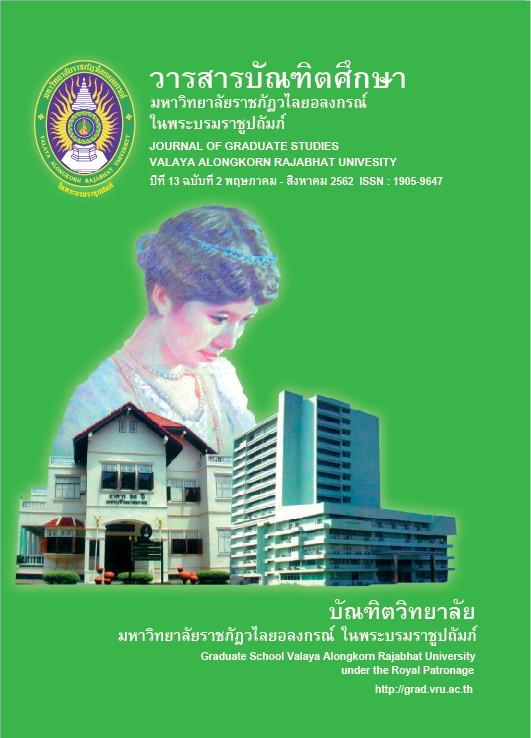TEACHING AND STUDYING PSYCHOLOGY THAI REFLECTS THROUGH THAI LITERATURE
Main Article Content
Abstract
This article aims to focus on a reflection through Thai literature which shows that since in the past, the Thai language teaching and studying have always been used to induce students to be obedient, diligent and to have endeavours to learn with their individual abilities and intelligence. Students compete with themselves psychologically, and if they are obedient and pay attention in class, they reap the reward of gaining more knowledge by being taught without any obscurity. Therefore, the nature of using this kind of teaching and studying psychology complies with Thailand's way of life, customs, thoughts, and core values. Customs, tradition, and culture are deeply rooted even though the ways of life have changed over time. Furthermore, Thai literature shows that there are various historical teaching and studying methods that can be used as a guide to teach and study in the present; for example, teachers’ roles, students’ roles, learning motivations, learning by memorising and repeating, teaching and studying methods that use nature and the environment, students' age and individual differences.
Article Details

This work is licensed under a Creative Commons Attribution-NonCommercial-NoDerivatives 4.0 International License.
บทความทุกเรื่องได้รับการตรวจความถูกต้องทางวิชาการโดยผู้ทรงคุณวุฒิ ทรรศนะและข้อคิดเห็นในบทความ Journal of Global of Perspectives in Humanities and Social Sciences (J-GPHSS) มิใช่เป็นทรรศนะและความคิดของผู้จัดทำจึงมิใช่ความรับผิดชอบของบัณฑิตวิทยาลัย มหาวิทยาลัยราชภัฏวไลยอลงกรณ์ ในพระบรมราชูปถัมภ์ กองบรรณาธิการไม่สงวนสิทธิ์การคัดลอก แต่ให้อ้างอิงแหล่งที่มา
References
Brophy, J. E. (2004). Motivating students to learn. (2nd ed.). Mahwah, NJ.: Erlbaum .
Bruner, J. S. (1961). The act of discovery.Harvard Educational Review. 31(1), 21-32.
Eccles, J. S., & Wigfield, A. (2002). Motivational beliefs, values, and goals. Annual Review of Psychology. 53, 109-132.
Gaustad, J. (1992). Nongraded Education: Mixed-age, Integrated, and Developmentally Appropriate Education for Primary Children. OSSC Bulletin. Eugene, Oregon: Oregon School Study Council.
Glasersfeld, E. (1995) Radical Constractivism, London: Falmer press.
Glasser, W. (1999). Choice theory: A new psychology of personal freedom. New York, US: HarperPerennial.
Goodlad, J. I. and Robert, H. A. (1987). THE NONGRADED ELEMENTARY SCHOOL, Revised Edition. New York: Teachers College Press, Columbia University.
Haddad. (2006). Practical Tips for Teaching Large Classes: A Teacher’s Guide. Bangkok: UNESCO.
Larsen-Freeman, D. (2000). Techniques and Principles in Language Teaching. Oxford: Oxford University Press.
Literature and History, the Fine Arts Department. (2003). prathom kō̜ kā prathom kō̜ kā hat ʻān pathommālā ʻaksō̜n niti bǣprīan nangsư̄ Thai [Sepa Khunchang-Khunphan].
Limaksorn, W. (2011). čhittawitthayā kānsưksā [Educational Psychology]. (5thed.). Songkhla: Thaksin University.
McCarthy, J. P., & Anderson, L. (2000). Active learning techniques versus traditional Teaching styles: two experiments from history and political science. Innovative Higher Education. 24(4), 279-294.
Moli, Phra Thep and Amaraphilukkit, Phra. (1970). prathom kō̜ kā prathom kō̜ kā hat ʻān pathommālā læ ʻaksō̜n niti bǣprīan nangsư̄ Thai [Prathom Kor Ka].
Muenchana, R. (2015). čhittawitthayā kānsưksā kap lakkān sō̜n [Educational Psychology and Teaching]. Journal of Educational Review Faculty of Education in MCU. 2(2), 1-9.
Prathom Kor Ka reading practice, Prathommala, Aksorniti and six royal lessons]. Phra Nakhon: Odeon Store.
Phu, Sunthorn. (1978). kāp phra chai Suriyā [Karb Phrachaisuriya]. (Printed in memoriam for the funeral of Chiam Chai Sri). Phra Nakhon: Rung-ruang-ratana-printing.
Piaget, J. (1980). The psychogenesis of knowledge and its epistemological significance.In M.Piatelli-Palmarini (Ed.), Language and learning. Cambridge, MA: Harvard University Press.
Priyattham Thada (Phae Talalak), Phraya. (1972). bōrān sưksā [Ancient Education]. Phra Nakhon: Prasanmit Publishing House.
Schunk, D. H., Pintrich, P. R., & Meece, J. L. (2008). Motivation in education: Theory, research, and applications (3rd ed.) Upper Saddle River, NJ: Pearson Education.
Stipek, D. J. (1998). Motivation to learn: From theory to practice. Boston, MA: Allyn & Bacon.
The Fine Arts Department. (1966). subin kham kāp [Subintakumarn]. Phra Nakhon: Silapabunnakarn. Practice. Boston, MA: Allyn & Bacon. (3rded.). Bangkok: Kurusapa Businees Organization.
Vygotsky, L. S. (1962). Thought and language. Cambridge, MA: MIT Press.
Wentzel, K. R., & Wigfield, A. (Eds.). (2009). Handbook of motivation in school. Mahwah, NJ: Erlbaum.


